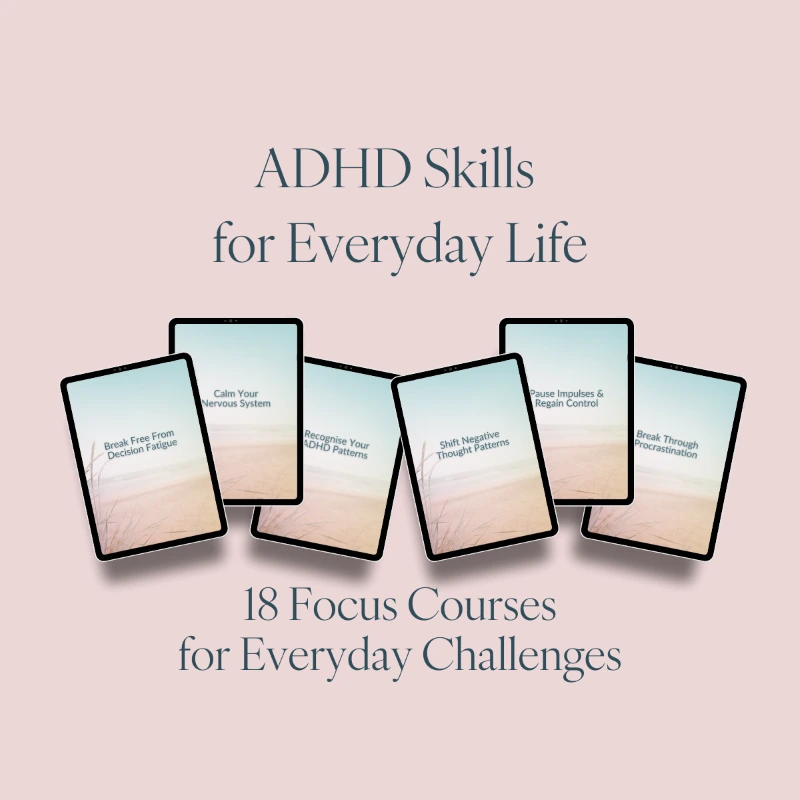People often ask me, “What’s the one thing that will actually help me feel better?”
Most of the people I work with already suspect they have ADHD or have recently been diagnosed. Others come in feeling overwhelmed, forgetful, or stuck in a cycle of starting things and not finishing them, traits that often line up with ADHD.
During therapy, they begin to recognise what’s really going on and understand how their brain works. Many feel tired, frustrated, or like they’re running on empty, and they just want to feel like themselves again.
For so many of them, the thing that makes the biggest difference is something they never expect: self-praise.
Why Self-Praise Can Be Hard with ADHD
People with ADHD often find it easier to take in what others say than notice their progress. Many have spent years relying on validation from others, whether from a boss, a friend, or the quick dopamine hit of social media. It’s not that they need praise more than anyone else, but the ADHD brain responds strongly to immediate rewards and feedback.
Add to that the years of being told to try harder, be more organised, or stop being so forgetful, and it’s no surprise that the focus tends to fall on what they haven’t done rather than what they’ve achieved.
Self-praise doesn’t always come naturally to many people with ADHD. They’ll often talk about their perceived shortcomings rather than celebrate what they’ve achieved. Some even tell me it feels a bit cringe-worthy at first. Because they’re so used to focusing on what went wrong or what didn’t get done, celebrating wins, big or small, can feel almost wrong.
But this discomfort isn’t just about mindset, it’s also how the brain works. ADHD brains can be wired to focus on what’s wrong (a process called negativity bias), so learning to notice the good takes practice.

A Lifetime of Feeling ‘Not Good Enough’
I recently worked with a client for over a year before they could finally say something positive about themselves. And that isn’t unusual. That moment was a huge breakthrough when they finally acknowledged their progress.
ADHD often comes with years, sometimes a lifetime, of feeling like you’re not good enough. It’s no wonder self-praise feels so unfamiliar.
I you find it hard to shake off those thought of not quite meeting the mark, or not being good enough you might like my course Shift Negative Thought Patterns, which can support you with this.
Rewiring the ADHD Brain for Self-Praise
Self-praise isn’t about ego or arrogance. It’s about acknowledging effort over outcome, and giving yourself the same kindness you’d offer a friend.
Think about it, if your friend said they managed to send an important email despite feeling overwhelmed, you’d probably say, “That’s brilliant. Well done!”
But when it’s you? You might think, “Well, I should have done that days ago.”
If that sounds familiar, you can work on it, and I promise it will make a real difference.
Small Steps to Start Practising Self-Praise
- Notice the small wins – Replied to an email? Did you take a break before burnout hit? Did you get out of bed on a tough day? That’s worth acknowledging. Tiny victories count.
- Reframe the self-talk – Instead of saying, “I only did one thing today,” try, “I got the most important thing done today.”
- Write it down – A quick list of your ‘wins of the day’ in your journal or notes app can help retrain your brain to spot the good.
- Say it out loud – It might feel awkward at first, but saying “I’m proud of myself for getting through today” genuinely works.
- Start with neutral language – If praise feels too strong, ease in. Try, “I made an effort today, and that counts.” Over time, your brain learns to accept progress as valid.
Noticing your Wins
And this is why self-praise matters more than it seems. For many people with ADHD, it is one of the first things that genuinely changes how day-to-day life feels. Not because it removes challenges, but because it changes the relationship you have with them.
When you begin to notice your wins, rather than only what is left undone, your nervous system settles. Motivation becomes more accessible. Setbacks feel less personal. Over time, self-praise helps rebuild trust in yourself, and that can be the difference between constantly starting again and being able to keep going.
It is not about inflating your ego or pretending things are easy. It is about recognising the wins that has always been there, and allowing yourself to count them.



